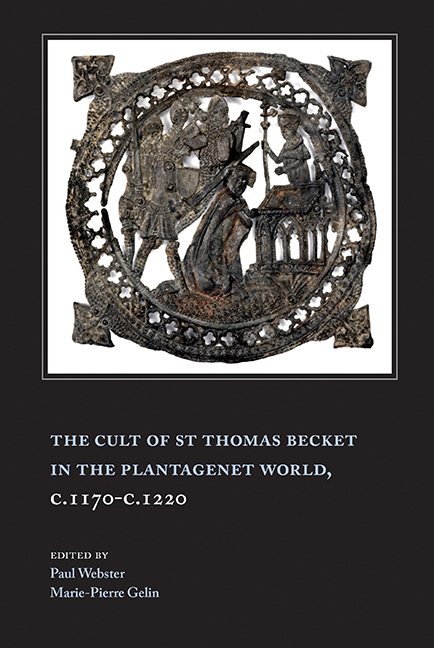Book contents
- Frontmatter
- Contents
- List of Illustrations
- List of Contributors
- Preface
- Acknowledgements
- List of Abbreviations
- 1 Introduction. The Cult of St Thomas Becket: An Historiographical Pilgrimage
- 2 Becket is Dead! Long Live St Thomas
- 3 The Cult of St Thomas in the Liturgy and Iconography of Christ Church, Canterbury
- 4 Thomas Becket and Leprosy in Normandy
- 5 Thomas Becket in the Chronicles
- 6 Matilda, Duchess of Saxony (1168–89) and the Cult of Thomas Becket: A Legacy of Appropriation
- 7 Leonor Plantagenet and the Cult of Thomas Becket in Castile
- 8 Crown Versus Church After Becket: King John, St Thomas and the Interdict
- 9 The St Thomas Becket Windows at Angers and Coutances: Devotion, Subversion and the Scottish Connection
- Bibliography
- Index
7 - Leonor Plantagenet and the Cult of Thomas Becket in Castile
Published online by Cambridge University Press: 25 October 2017
- Frontmatter
- Contents
- List of Illustrations
- List of Contributors
- Preface
- Acknowledgements
- List of Abbreviations
- 1 Introduction. The Cult of St Thomas Becket: An Historiographical Pilgrimage
- 2 Becket is Dead! Long Live St Thomas
- 3 The Cult of St Thomas in the Liturgy and Iconography of Christ Church, Canterbury
- 4 Thomas Becket and Leprosy in Normandy
- 5 Thomas Becket in the Chronicles
- 6 Matilda, Duchess of Saxony (1168–89) and the Cult of Thomas Becket: A Legacy of Appropriation
- 7 Leonor Plantagenet and the Cult of Thomas Becket in Castile
- 8 Crown Versus Church After Becket: King John, St Thomas and the Interdict
- 9 The St Thomas Becket Windows at Angers and Coutances: Devotion, Subversion and the Scottish Connection
- Bibliography
- Index
Summary
When Alfonso VIII of Castile married Leonor, the sixth child of King Henry II of England and Eleanor of Aquitaine, in September 1170, the young and small Iberian kingdom entered the most important dynastic network in twelfthcentury Europe, and its affairs thereafter attracted attention in the Angevin dominions. Robert of Torigni, the Norman chronicler and the princess's godfather, noted: ‘by God's favour, and by his own virtue, this Alfonso has married my dearest lady and my baptismal daughter, Leonor, the daughter of the king of England, whose advice and assistance have been productive to him of many happy results.’ An Angevin outpost south of the Pyrenees, as it were, Leonor was to become the first dynastic link between England and Spain in the Middle Ages.
On 29 December 1170, only some three months after the marriage, Thomas Becket, archbishop of Canterbury, was murdered in his cathedral. Becket, once the king's most trusted minister, had become his most stubborn adversary, and the news of his brutal assassination sent shock waves all over Europe, where it was interpreted as martyrdom in defence of the Church's liberties and jurisdiction. Pilgrims flocked to the martyr's tomb at Canterbury. Many miracles were attributed to Becket's intercession and promptly recorded. He was, accordingly, widely venerated as a saint, and the pope canonised the martyr as early as 1173. Even if the ultimate responsibility for the archbishop's death lay with the king, Henry was personally innocent. He sent embassies to Rome and was decisively defended by Peter of Blois, who wrote to the archbishop of Palermo in 1177:
In conscience I believe in no way that the king was guilty of this thing; and the most complete confirmation of this the lord Theodinus, bishop of San Vitale, and the lord Albert, the chancellor, will make to you, who because of this matter investigated in our regions performing the office of legate; they confirmed the innocence of the man.
Henry, however, was compelled to perform public penance. As Edward Grim explained, ‘even though the shedding of innocent blood had not been done by or through him, the king bore responsibility for it on account of his anger’, and in 1174, he humbly travelled the pilgrim road to Canterbury and confessed his fault.
- Type
- Chapter
- Information
- Publisher: Boydell & BrewerPrint publication year: 2016



